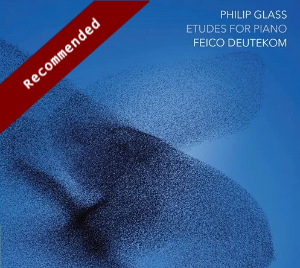
Philip Glass (b. 1937)
Etudes for piano (selection) (1994-2012)
Feico Deutekom (piano)
rec. (date not given), Zeeuwse Concertzaal, Middelburg, The Netherlands
Orange Mountain Music OMM0167 [76]
I have long thought that the minimalist idiom, as practised by Steve Reich and Philip Glass, was powerful but also limited. Among much that is only of curiosity value, it has realised some stunning successes: I am think of Reich’s Music for Eighteen Musicians and The Desert Music and Glass’s Music in Twelve Parts and the opera Akhnaten. It has taken me some time to catch up with Glass’s piano Etudes, but now I have heard some of them, I must rank them among the successes. Glass himself has apparently said that this is the work of his that is most likely to be remembered.
Glass started writing these Etudes to improve his own piano technique, and this accounts for the first book, of ten studies. The second book, another ten, were written with other players in mind and tend to be more demanding technically. They all feature, as one would expect, Glass’s signature repeating arpeggio patterns and ostinati and his characteristic chord progressions. Many of them have that powerful sense of melancholy and nostalgia which is so attractive in his best music. His feeling for piano sonority is very good and he is very varied and imaginative in his textures, though each Etude, as is traditional in the genre, concentrates on one particular layout. At first I thought there was too little variety among these pieces, but on repeated listening I corrected that impression: there is a wide range of textures and techniques, but the same personality shines through all of them. The Etudes tend to be longer than those by Chopin or Debussy, and the longest here, 20, lasts over ten minutes.
This recital neither presents the whole set, which would run to two CDs, nor are those chosen performed in numerical order, but both the choice and the sequence of eleven of them are personal decisions by Feico Deutekom, the pianist here. I notice the irregular rhythms in 2 and 17, a rather Chopinesque bass line in 4 and 10, the use of repeated notes in 6, of a richer texture than usual in 11 and 17 and the use of dialogues: between two voices in the treble in 9 and between treble and bass in 3. 5 is gentler and quieter than most and 20, with which the recital ends, eschews some of the regular figuration for a longer lyrical line. Some of them are relatively simple and straightforward and some more demanding, but they are not obviously virtuoso vehicles as are, for examples Liszt’s Etudes.
Feico Deutekom is a singer and arranger as well as a pianist and for many years he ran the Attacca Ensemble, a choir specialising in contemporary music. He has also played with Glass at the composer’s invitation and arranged various Glass works for different ensembles. This disc, like a predecessor one of solo piano arrangements of Glass works, appears on Glass’s own label, Orange Mountain Music, which shows that it has the composer’s approval. Deutekom clearly understands and loves this music and plays it with sensitivity and understanding. The recording is excellent.
I have enjoyed this, my first encounter with Glass’s Etudes. Indeed, I plan to obtain the sheet music and have a go at some of them myself. However, I do need to note that there have been many other recordings: several pianists have taken some or all of these works into their repertoire so that they may have already achieved classic status, as have the Etudes of Ligeti, another recent contributor to the form. For another selection, that by Víkingur Ólafsson on DG has been highly praised (review). For a complete set, that by Maki Namekawa on Glass’s own Orange Mountain label has been considered the standard, though our reviewer had reservations about the recording (review). There are several others. Meanwhile, I am happy to recommend this to those who want a selection on one disc rather than the whole set.
Stephen Barber
Buying this recording via a link below generates revenue for MWI, which helps the site remain free



















